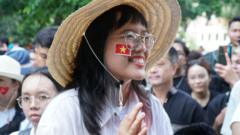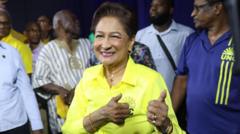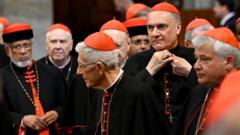In a significant political shift, Namibia has elected its first-ever female president, Netumbo Nandi-Ndaitwah, amid the governing party's sustained control despite regional upheavals.
Namibia Makes History with First Female President Amidst Political Stability

Namibia Makes History with First Female President Amidst Political Stability
Namibia's ruling party secures its position while breaking gender barriers in leadership.
In an era marked by changing political dynamics across southern Africa, Namibia has defied the trend of opposition gains by reinforcing the strength of its ruling party. On December 3, 2024, Namibia's electoral commission announced the victory of Netumbo Nandi-Ndaitwah as the country's first female president, alongside the South West Africa People's Organization (SWAPO), which has maintained power since Namibia's independence.
Ms. Nandi-Ndaitwah, 72, previously served as deputy prime minister and minister of international relations under the late President Hage G. Geingob, who passed away in February. After his demise, she emerged as a prominent candidate, successfully securing 57.31% of the presidential vote. This election positions her among the select few women who have taken on leadership roles in Africa.
While SWAPO's seat count in Parliament decreased from 63 to 51 out of 96, the party continues to lead the nation despite economic frustrations voiced by many citizens. The Independent Patriots for Change, spearheaded by former SWAPO member Panduleni Itula, claimed second place with 20 parliamentary seats, indicating a growing opposition landscape as multiple parties contested the election.
Despite SWAPO's apparent vulnerability, Nandi-Ndaitwah's election is celebrated as a historic milestone for female representation in African leadership, signaling potential for change in the political narrative of Namibia.
Ms. Nandi-Ndaitwah, 72, previously served as deputy prime minister and minister of international relations under the late President Hage G. Geingob, who passed away in February. After his demise, she emerged as a prominent candidate, successfully securing 57.31% of the presidential vote. This election positions her among the select few women who have taken on leadership roles in Africa.
While SWAPO's seat count in Parliament decreased from 63 to 51 out of 96, the party continues to lead the nation despite economic frustrations voiced by many citizens. The Independent Patriots for Change, spearheaded by former SWAPO member Panduleni Itula, claimed second place with 20 parliamentary seats, indicating a growing opposition landscape as multiple parties contested the election.
Despite SWAPO's apparent vulnerability, Nandi-Ndaitwah's election is celebrated as a historic milestone for female representation in African leadership, signaling potential for change in the political narrative of Namibia.






















